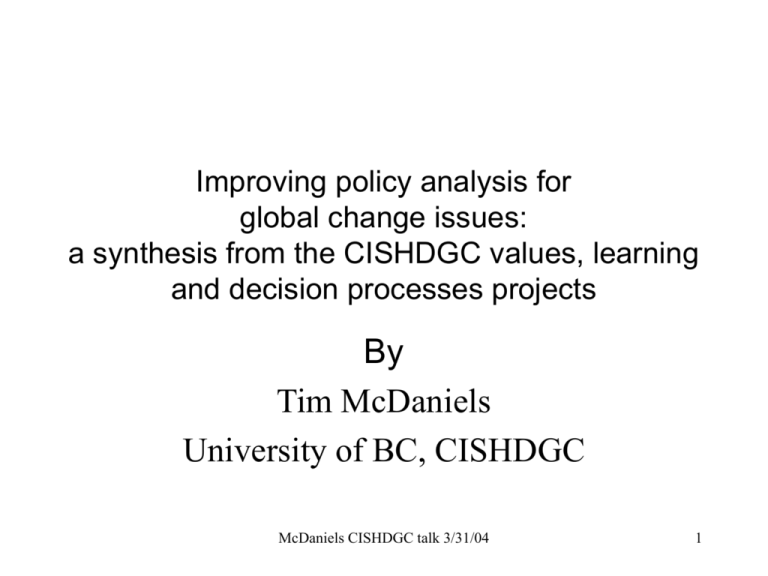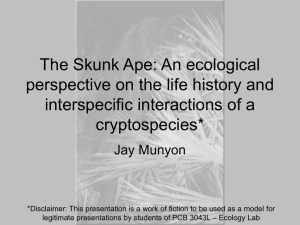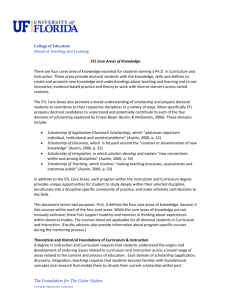Improving policy analysis for global change issues: a synthesis from
advertisement

Improving policy analysis for global change issues: a synthesis from the CISHDGC values, learning and decision processes projects By Tim McDaniels University of BC, CISHDGC McDaniels CISHDGC talk 3/31/04 1 Outline • • • • • Introduction Kinds of and structures of decisions? Decision processes? Approaches to values for these decisions? Role of learning? McDaniels CISHDGC talk 3/31/04 2 1.) Introduction • This talk has three points of departure: – Morgan, et al editorial: why standard approaches to PA are insufficient for climate change – Hard versus soft systems analysis – Kates et al, 2000: Sustainability science McDaniels CISHDGC talk 3/31/04 3 Assumptions, Inadequacies of Standard PA (Morgan, et al) • Single DM, single problem, agreement on a single societal view • Non-marginal, manageable change • Values known, static; Utility max is goal • Time preference: discounting sensible • Uncertainties modest, manageable • Systems linear McDaniels CISHDGC talk 3/31/04 4 Hard vs Soft systems analysis (Checkland et al) • Hard: clear decision, well bounded, values defined, single DM, uncertainties definable, analytical/optimization tools (OR) applicable • Soft: problems ill defined, vaguely bounded, values unclear, no obvious DM, • Their view on path forward: soft/hard complementarity; e.g., use soft systems ideas to structure analysis for hard systems application McDaniels CISHDGC talk 3/31/04 5 Sustainability Science (Kates, et al, 2000) • Recognizes limits of reductionist science for global change problems, sustainability • Argues for a new, integrative, multiple scale, north/south sensitive, human/natural systems approach to science • Their concern is only a new perspective on science • Says nothing about how to conduct analysis to analyze, make choices, implement, informed by that science McDaniels CISHDGC talk 3/31/04 6 CISHDGC research contributions • Many incremental steps toward addressing and improving on the standard tools of policy analysis for global change • Imagine matrix of inadequacies (listed earlier) and contributions from investigators to address them • Need a summary effort to recognize, assemble our findings and insights; put forward perspectives, approaches to PA for global change • Here focus on those associated with problem choice, decision process, values, learning McDaniels CISHDGC talk 3/31/04 7 2.) What kinds of decisions? • Conventional PA for GC often addresses “the global decision” (CC emission controls) or single level, constrained decisions (e.g. resource management, env health, disaster preparedness) given status quo • We have addressed the links among decisions across scales, time, groups • Reasoning is that such decisions are so path dependant (time) or scale dependant (levels of governance) we need to address such links to make sensible progress McDaniels CISHDGC talk 3/31/04 8 Multiple scales and levels • Match scales of assessment, and levels of regulation and administration to the problem – McDaniels and Dowlatabadi (2004) • Effective regulation across levels requires both appropriate knowledge and effective jurisdiction – Appropriate Knowledge: nature and dynamics of impacts, values, alternatives – Effective Jurisdiction: compatible with scales, competent, legitimate McDaniels CISHDGC talk 3/31/04 9 Implications of gaps, mismatches • Example of salmon aquaculture – A site-by-site regulatory regime, but cumulative impacts are the predominant concern – Site-based regulation not really feasible to judge sustainability of industry – Local governments have attempted to regulate land use to respond to regional, provincial concerns McDaniels CISHDGC talk 3/31/04 10 Short term objectives for longer term ends • Framework of multiple objectives for characterizing what is desired in CC policies over the next 20 years • Emphasis on learning as an explicit objective • Intent is create the capability, opportunities for better decisions 20 years into future – Keeney and McDaniels 2002 McDaniels CISHDGC talk 3/31/04 11 Short term decisions to get to long term desired ends • Georgia Basin Project, Quest – Visualization tool, gaming, value formation • Given an expressed desired future for a region (where we want to go) , what are the important near-term decisions that must be made within the region’s governance structure to get onto the desired paths (how to get there); what are tradeoffs for other related decision contexts – Charlie Wilson’s current work (2004) McDaniels CISHDGC talk 3/31/04 12 3. Approaches to decision processes • Most policy analysis guides recognize benefits of iteration, recognition of different elements of good decision making • Yet how to make this work on extremely complex problems, with stakeholders, addressing GC problems, isn’t well understood • How to proceed through decisions, involving whom? McDaniels CISHDGC talk 3/31/04 13 What’s good decision process? Hammond, Keeney and Raiffa, 1999 Smart Choices Keeney, 1992 Value-focused thinking Neither cast in terms of, or really address environmental choices, particularly with stakeholder group, which have their own kinds of complexities McDaniels CISHDGC talk 3/31/04 14 Efforts regarding decision processes for GC decisions • Conceptual: elements of process and application for decision aiding in any context – (McDaniels and Gregory 1996-2004) • Experimental: good group process can lead to improved valuation decisions (measured via whether standard biases can be avoided) – (McDaniels, Gregory, Arvai, Chunpagdee, 2003) McDaniels CISHDGC talk 3/31/04 15 Applied Findings • Water use planning efforts in BC • Good process, attention to values, AM all contributed to achieving great outcomes, consensus decisions for electric utility planning with stakeholders to balance power, fisheries, flood control, recreation – McDaniels, Gregory, Fields, 1999; Gregory, McDaniels and Fields, 2002; others in process McDaniels CISHDGC talk 3/31/04 16 Participatory Action processes • Will Trousdale’s work in Philippines and Jamil Bundalli’s work in Kenya shows that VFT is a good way to structure, conduct participatory action research (Tourism, rural energy planning) • McDaniels and Trousdale (1996) • Jamil’s MSc project draft underway (2004) McDaniels CISHDGC talk 3/31/04 17 4.) Values and Valuation • Multiple objective approaches seem only sensible basis for valuation of global change issues: – fewer strict assumptions about decision rules, how values are measured, role of income (How much should society pay, not how much are you WTP) – McDaniels, 2001, Encyclopedia of GC • Judgment tasks must be kept manageable, help construct values in context – Voting, referendum notions for preference elicitation – McDaniels, 1996, McDaniels and Thomas, 2000 McDaniels CISHDGC talk 3/31/04 18 Values for Non-marginal change • Work on compensation for Metis lands losses has helped us understand both what is needed to value non-marginal change, and applied approaches for work with indigenous people on valuing their intangible, spiritual, cultural losses from loss of resources over 50 years – McDaniels and Trousdale, 2004 McDaniels CISHDGC talk 3/31/04 19 What is needed for valuing, compensating for NMC? • A legal property rights regime establishing compensation for losses (all kinds) • envisioning what the future(s) could be with and without the change • Understanding what other changes will go on around, outside of this particular change (the context) • judging what values matter in comparing with and without cases • Judging the relative importance of the range of values affected by the change, from the viewpoint of the affected parties • Use of a metric, method for aggregation, across the different kinds of values, w and w/o the change (indirect processing out if one impact is in dollars) • Some means of addressing the impact changes, aggregation over time • Using the results to argue for compensation, or better still, the kinds of actions to mitigate losses McDaniels CISHDGC talk 3/31/04 20 Valuation within context of alternatives • Issues of evaluability (Hsee) • Experimental work on values within a structured process, with alts, and a context, compared to standard practice • Use of structured decision process reduces standard heuristics, biases (embedding) McDaniels CISHDGC talk 3/31/04 21 5.) Learning (AM) as a strategy • Three projects concerned with learning • Objectives that comprise a framework for for short term CC policy decisions that emphasize learning – Keeney and McDaniels 2001 • Treating learning as an objective in working with SH groups, the value of learning – McDaniels and Gregory 2004 McDaniels CISHDGC talk 3/31/04 22 Newest AM project: learning plan for salmon aquaculture • Developing a “learning plan”for salmon aquaculture • First step: what are the questions people want to answer (SH workshop, some problems) • Future steps: refining questions, developing strategies to answer them, setting priorities • Other parts: a FN plan, Issues of time McDaniels CISHDGC talk 3/31/04 23 6. Conclusions, implications • The effort to build new approaches to policy analysis that can adequately address the kinds of issues called for in Sustainability Science could take as much work as, is linked to, the science itself • It is at least as important as the science in making better decisions McDaniels CISHDGC talk 3/31/04 24 Where we have come to • In total, the UBC work has made some progress on parts of the agenda for building the new PA – We have highlighted only some of it (nothing here on risk perception, risk communication, other work on values and decision making we have pursued) • Our emphasis has been on the problem-structuring and values-based side • Far more needed, huge opportunities • Making better decisions is a big concern for making new science relevant and helpful McDaniels CISHDGC talk 3/31/04 25








